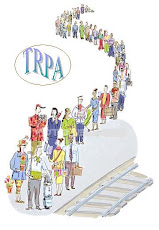Monisha Rajesh: Railways are a microcosm of society
After 100 train journeys across India, writerMonisha Rajesh knows the Indian Railwaysfairly well. Speaking with Srijana Mitra Das, Rajesh discussed what drove her to undertake several challenging trips, surprises on-board the Indian Railways - and the one thing that's endured amongst her co-travellers:
Why did you decide to undertake all these journeys?
I was born and brought up in the UK. Between 1991-93, my parents tried to live in India but found it difficult and returned. We only came back for family events. But i wanted to get a full feel of the country, not base my understanding on occasional visits. One day, i was reading an article about India's airline boom - but noticed that just below the air routes, there were train tracks that extended into every corner, no matter how small or remote. Airplanes seemed an incredibly expensive way to travel but trains were remarkably cheap and went simply everywhere. I came here in mid-January 2010 and ended up travelling for four months, taking 100 trains.
What does train travel reveal about a country?
Railways are a microcosm of society. A train contains everything, from first class with its AC, curtains, linen and cutlery, to general seating with people crow-ded onto wooden planks. Flying gets you stuck in a seat. You can only talk to one or two people near you. But walking up and down a train gives you a good idea of how Indian society is structured.
Was there a best journey - and a worst?
Well, in terms of sheer beauty, i'd say the Mandovi Express from Goa to Mumbai was my favourite because of the rivers, mango groves, coconut trees and villages we'd pass. I'd sit in the train doorway, at the feet of it all. The worst was towards April when it started getting hot. I took a passenger train from Jaisalmer to Bikaner at 11 am. I couldn't understand why the train was empty! There was no one to be seen except the ticket checker.
I understood when we began - red dust just came sweeping in through the bars! I ended drenched in pools of sweat.
Were there other problems on-board?
I was taken aback by the lack of cleanliness. It's not just on the trains. People would routinely throw plastic bags out of the door, adding to an ankle-deep sludge of plastic along the tracks. The toilets were often disgusting and the acid falling from them corrodes the tracks which have to be replaced much more often. I think it was a real shame that Dinesh Trivedi wasn't given a chance to install green toilets.
Finally, some remarkable things about India you've discovered?
I learnt that we may consider trains as just a means to commute - but a massive proportion of India is entirely dependent on the railways. It is the only way for rural areas to get anywhere or anything. Travelling by all sorts of trains, including India's only hospital train, i understood why the railways are called the lifeline of this country.
I was also struck by how people receive visitors. When they saw i was a young woman traveller, families would take me into their fold. I was in a compartment alone with men once and they were kind and helpful. People shared not only food but intimate details of their lives. They always wanted to chat! I found that such a contrast to London where people avoid even eye contact.
I think what India has is incredibly special. And travelling on its railways, i was glad it's stayed that way.
(Times of India, Mangalore, 13-8-2012)
Subscribe to:
Post Comments (Atom)


No comments:
Post a Comment